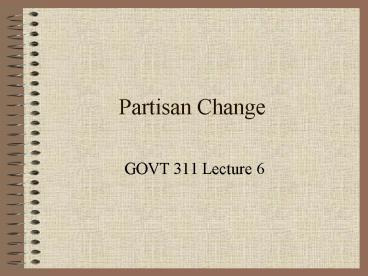Partisan Change - PowerPoint PPT Presentation
1 / 18
Title:
Partisan Change
Description:
Partisan Change GOVT 311 Lecture 6 Types of Surveys Cross-sectional conducted on one universe of people at one point in time Panel same group of people ... – PowerPoint PPT presentation
Number of Views:56
Avg rating:3.0/5.0
Title: Partisan Change
1
Partisan Change
- GOVT 311 Lecture 6
2
Types of Surveys
- Cross-sectional conducted on one universe of
people at one point in time - Panel same group of people interviewed over
time - Panel attrition loss of respondents over course
of survey
3
Voting Behavior of Partisans
- Strong Partisans are more loyal than weak
partisans (F Z p.90) - Overall defection rates of strong and weak
partisans for presidential elections has remained
constant with a small decrease in the 1990s.
Partisans of both types have become more loyal. - More partisans tend to defect towards the winning
candidate, especially when there is an incumbent
running in the election.
4
Partisan Voting
- In Congress, Democrats held an edge in
defections, with more Republicans defecting to
Democratic candidates, until the election of
1994. (Flanigan and Zingale p.92) - Why?
5
Are Independents Independent?
- Independents are more likely to vote in the
direction of the winning presidential candidate
(F Z p.96) - Independents show more support for third party
candidates - A majority of Independents vote for partisan
candidates, even when third party candidates are
present in the election.
6
Partisan Turnout
- Strong Partisans are more likely to vote than
weak partisans. Independents are the least
likely to vote (F Z p.94) - Strong Partisans have more interest in politics.
7
Partisan Change
- Period effects
- Generation effects
- Life-cycle effects
- (F Z p. 93)
8
Forecasting a Realigning Election
- Does an increase of independents among young
voters presage a realigning election?
9
Partisan Change
- Partisanship is something learned as a
consequence of great events that move everyone
(period effect) - Baseline Partisanship is learned when one becomes
voting age (generation effect, E T p.152) - Roaring 20s Republican
- Depression Democrats
- Sixties
- Protesters Democrats
- Non-Protestors Republicans
- Eighties Republican
- Nineties Democrats
- As one ages, partisanship changes (life-cycle
effect)
10
Life-Cycle of Partisanship
- As people age, they become more Republican
because of the air of respectability,
conservatism, and social status (American Voter
authors) - Is this true?
11
Percent Self-Identified Republicans (Source ANES)
12
Percent Self-Identified Democrats (Source ANES)
13
What do children learn?
- Pre-school 75 of children able to answer what
the policeman does. 10 could recognize the
president. 60 recognize the U.S. flag. - Early Childhood Children begin to become aware
of government. Generally view it in a favorable
and trusting light. - Late Childhood Still very trusting of
government, but some notion of what democracy is
begins to emerge. Children begin to separate the
people from the institutions, and begin to think
in partisan terms.
14
What do children learn?
- Adolescence Junior high students begin to think
like adults. Children develop ideology, and
notions of political efficacy. They remain
positive about the symbols and ideals of
democracy, but are cynical to the people. In
fact, during Clintons impeachment, youths age
11-18 were more in favor of impeachment than
adults.
15
Do Children learn from their Parents?
- Yes. Erikson and Tendin p.131.
- Also agree on policy issues (Erikson and Tedin p.
121). - Partisanship is transmitted from parents to
children (Flanigan and Zingale p.105, 106). - (Note there isnt a lot of current research in
this area)
16
Do students learn politics in school?
- Yes. Without a doubt schools have been used time
and again to politically socialize students, and
to teach loyalty and obedience to the existing
government order. - Is this a good thing?
17
The College Experience
- College students tend to self-identify more
liberal over time (E T p.145, 148). - Are more liberal on issues (E T p.149).
- Professors are more liberal than students (E T
p.147).
18
Social Network Theory
- The character of the contact is important. It
must include a political message to affect
political behavior.































